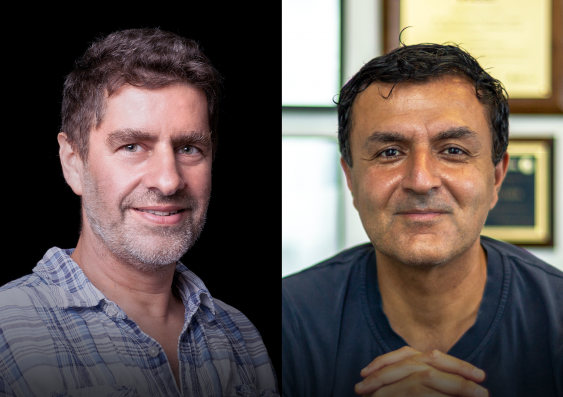UNSW researchers receive distinct honours within the scientific community
The American Association for the Advancement of Science has recognised UNSW academics for their contributions to the scientific enterprise.
The American Association for the Advancement of Science has recognised UNSW academics for their contributions to the scientific enterprise.

Two UNSW Sydney professors have been named Fellows of the American Association for the Advancement of Science (AAAS).
UNSW Engineering and Australian Research Council (ARC) Laureate Fellow, Professor Kourosh Kalantar-Zadeh, and UNSW Science’s Deputy Head of School of Physics, Professor Paul Curmi have been recognised for their extraordinary achievements in the progression of science.
Prof. Kalantar-Zadeh has been acknowledged for his seminal contributions to the fields of sensors, electronics and analytical chemistry, especially for innovations with two-dimensional semiconductors, ingestible sensors and liquid metals.
"It is a great honour to be elected as a Fellow of the American Association for the Advancement of Science which is the world's largest general scientific society,” said Prof. Kalantar-Zadeh.
“I am very happy that this election recognises my past and present group members’ contributions to the field of materials science, sensors and electronics.”
Recognised as one of the pioneers in liquid metal research, the society acknowledged Prof. Kalantar-Zadeh’s world-leading innovation in developing the first ingestible chemical sensor for diagnostics of gut disorders.
He has also led the advancement of new synthesis methods for two-dimensional semiconductors based on metal oxides and chemical compounds called chalcogenides.
UNSW Engineering Deputy Dean Industry Engagement, Innovation & Research Professor Ian Gibson applauded Prof. Kalantar-Zadeh’s achievement.
“Few Australians are elected Fellows of the AAAS. This very prestigious appointment is a recognition of the esteem in which Prof Kalantar-Zadeh is held globally,” said Prof. Gibson.
“It is richly deserved, and I wholeheartedly congratulate him.”
Prof. Curmi has been recognised for his important contributions to the understanding of protein structure, function, and dynamics, and intracellular patterns. He is currently working on a research project that will aim to build a biological molecular engine from scratch out of proteins.
"I am greatly honoured and humbled to receive this recognition,” said Prof. Curmi.
Dean of UNSW Science, Professor Emma Johnston commended Prof. Curmi for receiving this honour.
“Congratulations to Prof. Curmi on joining a cohort of distinct honours within the scientific community,” said Prof. Johnston.
“This recognition speaks not only to his outstanding contributions to science as a renowned structural biologist and molecular biophysicist, but to his leadership in the scientific community."
“AAAS is proud to bestow the honour of AAAS Fellow to some of today’s brightest minds who are integral to forging our path into the future,” said AAAS chief executive officer and executive publisher of the Science family of journals, Dr Sudip Parikh.
“We celebrate these distinguished individuals for their invaluable contributions to the scientific enterprise.”
The 2021 class of AAAS Fellows includes 564 scientists, engineers, and innovators spanning 24 scientific disciplines recognised for their scientifically and socially distinguished achievements.
Founded in 1848, AAAS is the world’s largest general scientific society and publisher of the Science family of journals and seeks to advance science and serve society through initiatives in science policy, international programs, education and public engagement.